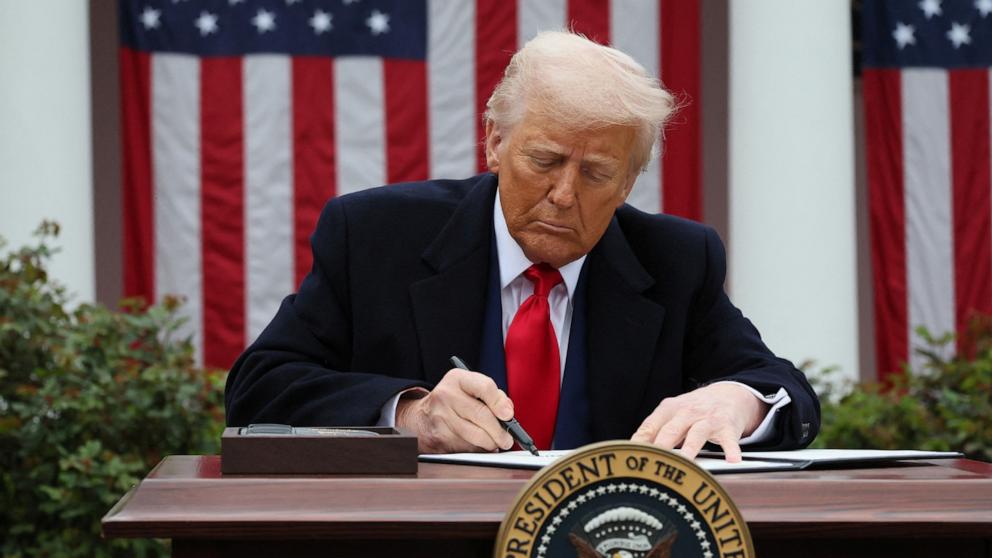In a dramatic move that could redefine global trade, former U.S. President Donald Trump has announced a sweeping 10% tariff on all imports into the United States.
The measure, which applies across the board, is coupled with even higher tariff rates for what he describes as the “worst offenders.”
The announcement marks one of the most significant shifts in U.S. trade policy in recent history, triggering sharp responses from world leaders and causing turbulence in financial markets.
A Watershed Moment for Global Trade
The decision represents a major escalation in Trump’s long-standing belief tha
t tariffs can be wielded as a tool to strengthen the American economy. Since his initial presidential term, Trump has championed the idea that higher import duties will incentivize domestic production, reduce reliance on foreign goods, and correct trade imbalances.
“We are taking back control of our economy,” Trump declared at a press conference in Washington. “For too long, other countries have taken advantage of American workers and businesses. Those days are over.”
However, while Trump’s supporters see this as a bold step to restore American manufacturing, critics warn of severe economic repercussions both in the U.S. and abroad. The announcement has already sent shockwaves through the global economic landscape.
Global Leaders Condemn the Move
Reactions from world capitals were swift and stern. The European Union condemned the tariff as a “major blow to the world economy.” European Commission President Ursula von der Leyen stated, “Unilateral measures like these disrupt global supply chains, undermine trust, and ultimately harm consumers.” She added that the EU would explore countermeasures to mitigate the impact on European businesses.
China, already engaged in a contentious trade relationship with the U.S., vowed retaliation. “The Chinese government strongly opposes this reckless and protectionist move,” said Chinese Foreign Ministry spokesperson Wang Wenbin. “China will take necessary actions to safeguard its economic interests.” While Beijing has not yet specified its response, trade experts speculate that China could impose tariffs on key American exports, such as agricultural products and technology components.
Australia, a long-time U.S. ally, also expressed deep concern. Prime Minister Anthony Albanese stated, “This is not the act of a friend. We expect the U.S. to engage with its partners fairly and cooperatively.” Australia has long relied on open trade policies and fears that increased tariffs could disrupt critical exports such as minerals and agricultural goods.
UK Warns of Economic Impact but Urges Restraint
British Prime Minister Keir Starmer acknowledged the economic risks associated with the new U.S. policy, stating, “Clearly, there will be an economic impact on the UK and other nations. However, we will respond with cool and calm heads.”
The UK, which has sought to deepen trade ties with the U.S. following Brexit, now faces a challenging predicament.
British manufacturers that rely on exporting goods to the U.S. could see rising costs, while UK consumers may experience price increases on American imports.
The British government is expected to engage in urgent discussions with Washington to seek exemptions or mitigate the effects of the policy.
Markets React with Sharp Declines
Financial markets responded immediately to the announcement, with stock indexes in London, Paris, and Berlin opening to significant declines.
The FTSE 100, DAX, and CAC 40 all recorded losses in early trading, reflecting investor concerns over potential economic instability.
Asian markets also experienced initial declines but showed signs of recovery as the day progressed.
In the U.S., the Dow Jones Industrial Average and S&P 500 opened lower, with investors bracing for the long-term impact of the tariffs.
Economists warn that while some American industries may benefit in the short term, the increased cost of imported goods could lead to inflationary pressures and potential retaliatory tariffs from major trading partners.
The imposition of a universal 10% tariff raises numerous questions about the future of U.S. trade relations. Will the Biden administration, if reelected, seek to reverse or modify these tariffs?
How will key trading partners respond, and will retaliatory tariffs escalate into a full-blown trade war?
Businesses worldwide are now scrambling to reassess their supply chains and strategies. American retailers, in particular, are expected to feel the pressure as they depend heavily on imported goods. Small businesses that rely on international suppliers may struggle to absorb higher costs, leading to potential job losses or price hikes for consumers.
Meanwhile, American consumers could face increased prices on everyday goods ranging from electronics to automobiles and food products.
While Trump’s policy is designed to boost domestic manufacturing, critics argue that tariffs often lead to higher prices for consumers without necessarily bringing jobs back to the U.S.
Trump’s decision to impose a broad tariff on imports is a defining moment in global trade policy.
While his administration frames it as a measure to protect American jobs and industries, the global economic consequences could be profound.
With world leaders preparing countermeasures, financial markets reacting negatively, and businesses weighing their next steps, the coming months will reveal whether this gamble strengthens the U.S. economy or exacerbates existing economic challenges.
As the international community braces for the fallout, one thing is certain: the rules of global trade have just been rewritten.

